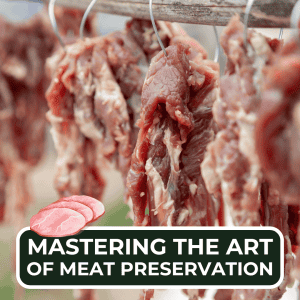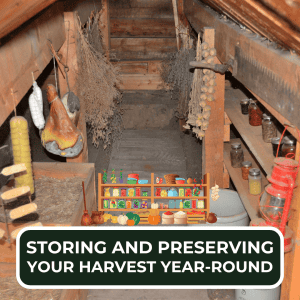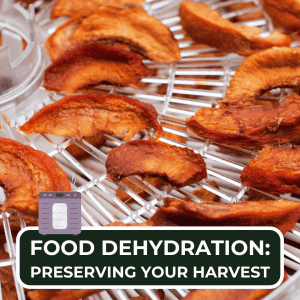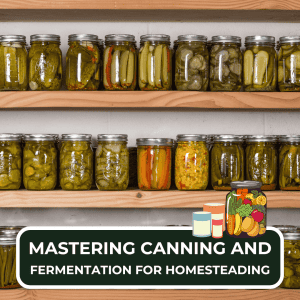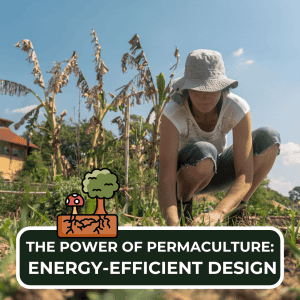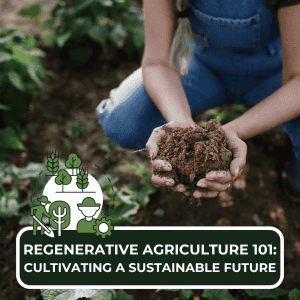Starting a homestead can be quite the adventure, although it also carries certain challenges. Many dream of cultivating their own food and living sustainably, yet they seem uncertain about the essential skills required for success.
Homesteading primarily focuses on self-sufficiency and minimizing reliance on modern supply chains—a goal that demands commitment and a variety of skills.
One significant point to maintain in mind is that gardening extends beyond merely planting seeds; it entails understanding soil, weather conditions, and plant care for a generous harvest.
This article will guide you through “10 Essential Skills Every Homesteader Should Master,” derived from Matthew and Amy’s comprehensive expertise in sustainable living. From proficient water management practices to learning basic carpentry, these insights aim to provide every homesteader with the necessary knowledge for a flourishing homestead.
Are you prepared to start on your journey?
Table of Contents
ToggleMastering Gardening Techniques
Mastering gardening techniques is vital for anyone aiming to become more self-sufficient on their homestead. From Matthew and Amy’s experience in the Costa Rican jungle, where they cultivated a close connection with nature, they learned that growing your own food requires skill and patience. Here are essential gardening skills every homesteader should know:
- Choose the Right Plants: Not all plants will thrive in your area. Learn which ones grow well in your climate and soil.
- Prepare the Soil: Good soil is the foundation of a productive garden. Test it for nutrients and pH level, then amend it with compost to improve fertility.
- Plant Carefully: Space plants properly according to their size at maturity. This allows enough room for growth and reduces competition for resources.
- Water Wisely: Understand each plant’s water needs. Some require more moisture, while others need less. Collect rainwater as a sustainable source.
- Protect Plants from Pests: Identify common pests in your area and use natural methods to control them, such as companion planting or natural predators.
- Guard Against Environmental Threats: Wind, frost, and heat can damage plants. Use shade cloths or windbreaks as needed to protect your garden.
- Harvesting Techniques: Know the right time to harvest each plant for peak flavor and nutrition. Some may need time to ripen off the vine.
- Save Seeds: After harvesting, select seeds from the healthiest plants for next year’s planting, ensuring a steady supply of crops.
- Record-Keeping: Keep detailed notes about what you plant, when you plant it, challenges you face, and how well each variety performs in your garden.
10.Build Essential Kitchen Skills: Learn how to cook from scratch using fresh produce from your garden, including making sourdough bread and fruit vinegar.
By applying these techniques on their homestead in Costa Rica, Matthew and Amy have been able to enjoy a rich variety of fresh foods directly from their garden while teaching others how to do the same – reinforcing that with patience and practice, anyone can master gardening techniques necessary for a flourishing homestead.
Effective Animal Care Strategies
Effective animal care is a cornerstone of successful homesteading. It includes everything from feeding to breeding, ensuring the well-being of livestock and poultry.
- Homesteaders ensure their animals have access to clean water at all times. Water is vital for health.
- They feed animals with nutritious food appropriate for each species, promoting growth and vitality.
- Regular grooming keeps animals clean, preventing disease and discomfort.
- Homesteaders practice safe breeding techniques, ensuring the health of both mother and offspring.
- They keep accurate records of each animal’s health, diet, and breeding history.
- Raising a variety of poultry like chickens, quail, and geese diversifies a homestead’s produce.
- Livestock options also include rabbits, dairy cattle, and meat animals to meet different needs such as food, milk, leather, and fertilizer.
- Homesteaders use fencing and housing to protect their animals from predators and harsh weather.
- Regular veterinary check-ups help prevent diseases and treat any issues early on.
- They learn first aid skills specific to their livestock and poultry to address emergencies promptly.
- Proper waste management practices maintain a clean environment for the animals to thrive in.
These strategies ensure that homesteaders can provide effective care for their animals while benefiting from the many resources they offer like eggs, meat, milk, and more.
Skills in Basic Carpentry and Construction
Cultivating fundamental carpentry and construction abilities is a prerequisite for every homesteader. These skill sets provide the capability to perform essential house repairs and construct unique features using eco-friendly materials. Here’s a well-structured list:
- Acquire proficiency in the safe usage of equipment such as hammers, saws, and drills. Familiarity with these tools forms the initial stage of fundamental carpentry.
- Accustom yourself in attaining precision while measuring and cutting wood. This talent assures that the components interlock flawlessly for any undertaking.
- Gain proficiency in construction methods for installations like chicken coops or greenhouses. This optimizes resource usage while increasing available space.
- Get acquainted with employing natural elements like earth, stone, and wood for building projects. These eco-conscious alternatives provide sustainability and durability.
- Hone abilities in rectifying infrastructural problems around the homestead, spanning from leaky rooftops to shaky foundations.
- Experiment in crafting furniture that caters to the unique requisites of your homestead, be it open-air seating or customized storage solutions.
- Welcome ventures involving eco-friendly materials to fabricate items such as cob ovens or log houses, significantly decreasing living expenses over time.
- Comprehend the basic principles of rainwater collection systems for effective water management on your property.
- Dedicate time to understand solar energy installation and maintenance to effectively utilize renewable energy sources for your homestead.
These carpentry and construction abilities are practical and they inspire homesteaders to create a lifestyle that is more self-reliant and has a smaller environmental footprint.
Techniques for Food Preservation
Perfecting food conservation is essential for every homesteader. It does more than just make the most of the harvest, it also guarantees a steady supply of food all year round. Here are the approaches that every modern homestead should consider:
- Canning: This technique implies putting foods in jars or cans and raising their temperature until micro-organisms are exterminated. The heat also makes sure the cans or jars are sealed, keeping the food safe and conserved.
- Drying: Homesteaders dry food by extracting moisture, which keeps bacteria, yeasts, and molds from proliferating. Fruits, herbs, and meats can be dried using sunlight, an oven, or a dehydrator.
- Freezing: Freezing conserves food at low temperatures that repel harmful bacteria. It’s suitable for fruits, vegetables, meats, and some dairy products.
- Cold storage: Making use of cool places like basements or root cellars allows for the storage of root vegetables and tough fruits like apples during the winter.
- Salt curing: Coating meat with salt eliminates moisture through osmosis, which significantly reduces decomposition and growth of harmful organisms.
- Smoking: Smoking meat or fish gives it a flavor while the slow drying process over time also assists in preserving it longer without the need for refrigeration.
- Pickling: Submerging food in vinegar or brine generates an acidic environment where bacteria can’t survive well, thereby preserving items like cucumbers or peppers for extended periods.
- Fermenting: Fermentation is more than just a preservation method, it also boosts its nutritional value by incorporating beneficial bacteria (probiotics). Sauerkraut, kimchi, and yogurt are typical fermented foods.
- Vacuum sealing: Extracting air before sealing food in bags inhibits spoilage by oxygen-dependent microorganisms and extends the freshness of the food.
Each technique comes with its own advantages, such as preserving nutrient value and taste at the moment when produce is freshest. The appropriate preservation method can dramatically extend your pantry supplies throughout every season and help you economize at the same time.
Efficient Water Management Practices
Efficient water management is crucial for homesteaders to sustain their gardens and livestock. They employ several techniques to ensure a steady water supply.
- Collect rainwater by installing gutters and storage tanks. This method captures water for irrigation and reduces reliance on wells.
- Drill wells to access underground water sources. It provides a consistent water supply, especially in areas with limited surface water.
- Build cisterns for storing large volumes of water. Cisterns help during dry spells when rainwater is scarce.
- Use greywater from household chores for non-potable purposes, like watering plants. This practice saves fresh water for drinking and cooking.
- Purify collected water through filters or boiling, ensuring it’s safe for human consumption and animal use.
- Implement drip irrigation systems in gardens to reduce water wastage and improve efficiency in watering plants.
- Practice rainwater harvesting techniques, like creating swales or rain gardens, which help in directing rainwater flow to needed areas.
- Educate everyone on the homestead about conserving water by fixing leaks and using low-flow fixtures.
- Monitor water usage regularly to identify areas where they can cut back without harming plant or animal life.
These strategies help homesteaders manage their water efficiently, ensuring they have enough for their needs while also caring for the environment.
Sustainable Energy Management
Matthew and Amy have always prioritized sustainable energy management on their homesteading journey. They learned early that managing energy efficiently is key to living off-grid successfully.
- Install solar panels: Solar energy is a renewable resource. Matthew and Amy use it to power their Fusion Home in the Costa Rican jungle. They find it reliable for their electricity needs.
- Harness wind power: In areas with consistent wind, they recommend setting up wind turbines. These can complement solar systems by providing power during cloudy days or at night.
- Explore hydroelectric systems: For homesteads near a water source, small-scale hydroelectric systems can generate a steady supply of power. This method has helped them be self-sufficient.
- Use traditional fuel wisely: Sometimes, renewable sources might not meet all energy needs. Matthew and Amy suggest using biomass, like firewood or biofuel, as a backup.
- Learn energy conservation techniques: Simple practices such as using LED lighting, insulating homes properly, and using energy-efficient appliances have significant impacts on reducing energy consumption.
- Track weather patterns: Understanding local weather helps plan the usage of renewable resources better. Knowing when to expect sunny or windy days enables them to optimize their energy collection and usage.
- Invest in battery storage: Storing excess energy generated during peak times is crucial for off-grid living. High-capacity batteries ensure they have electricity even when their primary renewable sources are not producing.
- Practice regular maintenance: Keeping solar panels clean and ensuring turbines are in good working order maximizes efficiency and extends the life of these systems.
- Educate yourself on sustainable practices: Constantly learning about new technologies and methods has been foundational for Matthew and Amy’s success in off-grid living.
- Share knowledge with the community: Teaching others about sustainable energy management has fostered a supportive network that benefits everyone involved.
Matthew and Amy’s approach to sustainable energy management combines modern technology with traditional practices, significantly enhancing their homestead’s self-sufficiency while minimizing environmental impact
Key Supplementary Skills for Homesteaders
Homesteaders often find mastering a few additional skills can greatly expand their self-sufficiency and resilience. Learning how to sew torn clothes, treat common ailments with natural remedies, or negotiate trades heightens both independence and community ties.
First Aid and Medical Treatment Essentials
Acquiring the skills to manage accidents and injuries is fundamental for every homesteader. Basic or advanced medical understanding can be crucial during crises. Here’s an all-inclusive list of first aid and medical treatment fundamentals crucial for the contemporary homesteader:
- Personalize first aid kits to cater individual preferences, considering the specific tasks and hazards on your homestead. Include items for cuts, burns, sprains, and other commonplace injuries.
- Master fundamental first aid methods such as cleaning and dressing a wound, applying pressure to halt bleeding, and identifying signs of infection.
- Obtain CPR certification from a reputable organization to be prepared in case of cardiac arrest.
- Know how to manage minor illnesses with off-the-shelf drugs or natural remedies, lessening the dependence on external medical aid.
- Maintain a guidebook on herbal medicine conveniently for referral on utilizing flora in your vicinity as natural treatments.
- Employ secure animal rearing techniques to avoid injuries from livestock like goats or poultry farming endeavors.
- Identify indicators of severe health issues that necessitate immediate professional medical intervention.
- Develop an emergency strategy that includes directions to the nearby hospital or healthcare center along with contact details.
- Apprise all family or team members on the location of medical supplies and basic usage guidelines.
- Regularly enhance your skills through lessons or workshops focusing on emergency healthcare, basic veterinarian skills for animal care, or alternative nature-based medicine options.
Furnishing oneself with this knowledge safeguards and also fosters self-reliance on the homestead, saving resources and time while providing tranquility.
Basics of Sewing and Mending
Sewing and mending are vital skills every homesteader ought to learn. These methods are beneficial as they conserve money and provide a high level of personalization for clothing and textile requirements.
Homesteaders who acquire the knowledge of sewing and mending can lessen their reliance on store-purchased clothing, thus substantially reducing living expenses. By incorporating traditional textile crafting methods into their everyday routines, they support sustainability while ensuring their clothing collection remains exceptional and personal.
Learning fundamental sewing and mending skills can turn discarded materials into valuable items.
Producing textiles from natural resources or reconstructing old clothes encourages a lifestyle of self-reliance that appreciates resourcefulness over buying habits. These skills are priceless for those intending to live off the grid or simply lower household spending.
As the repairing of clothes becomes a common practice, homesteaders find themselves capable of addressing most fabric-related predicaments at home without the need for expert assistance, hence reinforcing the principles of sustainability and thrift into all facets of homestead existence.
Using Natural Medicine
Homesteaders frequently cultivate their own sustenance, which includes a wide range of medicinal herbs and plants. These organic assets form the structural base for making efficient treatments at home.
Acquiring proficiency in making use of herbs and essential oils is precious for addressing usual health issues. This practice enhances health and also conserves funds that could potentially be spent on pharmacy trips for store-bought medications.
Through the process of creating and conserving these powerful plants, homesteaders arm themselves with natural medicine expertise. They educate themselves on crafting tinctures, salves, and teas from what sprouts in their garden or wild plants they gather.
This healthcare method emphasizes independence and cultivates a profound bond with nature’s remedial abilities.
Skills in Bartering and Entrepreneurship
Mastering the skills in bartering and entrepreneurship can save homesteaders a lot of money in the long run. They learn to understand the value of goods, which helps them avoid exploitation in trades.
This knowledge also aids in developing business acumen, necessary for turning hobbies into profitable ventures. Homesteaders use negotiation skills to get better deals, making their efforts more cost-effective.
Building social connections is another key aspect. It helps prevent feelings of isolation common among homesteaders. Networking with like-minded individuals offers opportunities to share resources and knowledge.
This exchange fosters a supportive community that thrives on mutual benefit and shared learning experiences. Through these networks, homesteaders find new ways to grow their projects sustainably.
Conclusion
Homesteaders gain much by mastering gardening, animal care, and basic carpentry. These skills ensure a self-sufficient lifestyle. Food preservation and efficient water use further support this independence.
Matthew and Amy’s journey in the Costa Rican jungle showcases these practices’ benefits. Their experience proves the effectiveness of sustainable living. Encouraging others to explore these essential homesteading skills can lead to rewarding homestead life.
FAQs
1. What are the essential skills every homesteader should master?
The essential skills every homesteader should learn include animal husbandry, learning how to sew and mend, beekeeping, foraging for natural materials, growing your own food, preserving food such as dehydrating or canning, basic first aid knowledge, baking bread and making homemade soap.
2. Why is it important to learn these homestead skills?
Learning these skills not only leads to self-sufficiency but also saves you money. For instance, knowing how to grow your own food means fewer trips to the grocery store while mastering sewing can help with mending clothes rather than buying new ones.
3. Can I still practice homesteading if I don’t have much space?
Absolutely! Many of these skills like baking your own bread or making homemade soap do not require much space. Even in limited areas, you might be able to grow quite a bit of produce using containers or vertical gardening techniques.
4. How does learning about animal husbandry benefit a modern homesteader?
Animal husbandry is an essential skill that provides multiple benefits from providing fresh eggs as food when raising chickens; honey from beekeeping; even hunting wild game could contribute towards self-sustainability on the homestead.
5. What role does knowledge play in successful homestead living?
Knowledge is essential for success in any field and this holds true for homesteading too! Whether it’s understanding hive management in beekeeping or knowing which medicinal plants grow in your area – each piece of information equips you better for efficient and effective homestead living.
6. Are there ways I can preserve my home-grown food?
Yes! Learning how to preserve food through methods like dehydration or canning ensures that you’ll have access to nutritious meals many years down the line without needing frequent trips to the grocery store.







